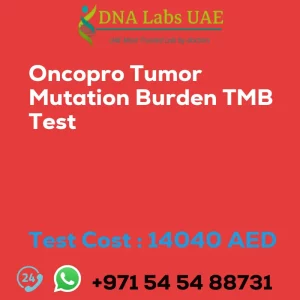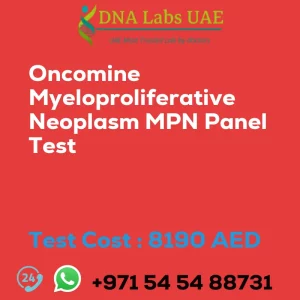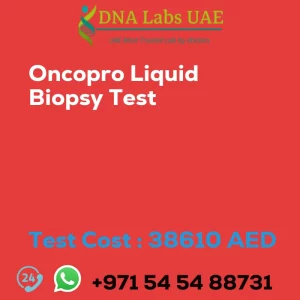IMMUNOHISTOCHEMISTRY COMPREHENSIVE PANEL Test
Test Name: IMMUNOHISTOCHEMISTRY COMPREHENSIVE PANEL Test
Components:
- Histopathology
- IHC markers
- Photomicrograph
Price: 1870.0 AED
Sample Condition: Submit Formalin fixed paraffin embedded block/s. Ship at room temperature. Provide a copy of the Histopathology report. Brief clinical history in Histopathology Requisition Form (Form 2) is mandatory.
Report Delivery: Sample Daily by 6 pm; Report 7 Working days
Method: Light Microscopy, IHC, Digital Photography
Test Type: Cancer
Doctor: Oncologist
Test Department: HISTOLOGY
Pre Test Information: Provide a copy of the Histopathology report. Brief clinical history in Histopathology Requisition Form (Form 2) is mandatory.
Test Details:
The IMMUNOHISTOCHEMISTRY COMPREHENSIVE PANEL test is a diagnostic test used in pathology to detect and analyze specific proteins in tissue samples. It involves the use of antibodies that bind to specific antigens in the tissue, allowing for the identification and localization of these proteins. The panel typically includes a range of antibodies that target different proteins of interest, such as markers for specific cell types, tumor markers, or markers of cellular processes.
By staining the tissue samples with these antibodies and observing the resulting color reactions, pathologists can gain valuable information about the presence and distribution of these proteins in the tissue. The IMMUNOHISTOCHEMISTRY COMPREHENSIVE PANEL test can be used in various clinical settings, including cancer diagnosis, tumor classification, and prognostic evaluation. It helps in identifying specific cell types or markers associated with certain diseases or conditions, aiding in accurate diagnosis and treatment planning.
The test is typically performed on formalin-fixed, paraffin-embedded tissue sections, which are prepared from biopsy or surgical specimens. The tissue sections are first deparaffinized and rehydrated, followed by antigen retrieval to expose the target proteins. The sections are then incubated with the primary antibodies specific to the proteins of interest. After washing, a secondary antibody is applied, which binds to the primary antibody and carries an enzyme or fluorescent label. The enzyme or fluorescent signal is then developed, allowing for visualization and analysis under a microscope.
The IMMUNOHISTOCHEMISTRY COMPREHENSIVE PANEL test provides valuable information about the cellular and molecular characteristics of tissue samples, aiding in the diagnosis, classification, and prognosis of various diseases. It is a powerful tool in the field of pathology and plays a crucial role in personalized medicine and targeted therapies.
| Test Name | IMMUNOHISTOCHEMISTRY COMPREHENSIVE PANEL Test |
|---|---|
| Components | *Histopathology*IHC markers *Photomicrograph |
| Price | 1870.0 AED |
| Sample Condition | Submit Formalin fixed paraffin embedded block\/s. Ship at room temperature. Provide a copy of the Histopathology report. Brief clinical history in Histopathology Requisition Form (Form 2) is mandatory. |
| Report Delivery | Sample Daily by 6 pm; Report 7 Working days |
| Method | Light Microscopy, IHC, Digital Photography |
| Test type | Cancer |
| Doctor | Oncologist |
| Test Department: | HISTOLOGY |
| Pre Test Information | Provide a copy of the Histopathology report. Brief clinical history in Histopathology Requisition Form (Form 2) is mandatory. |
| Test Details |
The IMMUNOHISTOCHEMISTRY COMPREHENSIVE PANEL test is a diagnostic test used in pathology to detect and analyze specific proteins in tissue samples. It involves the use of antibodies that bind to specific antigens in the tissue, allowing for the identification and localization of these proteins. The panel typically includes a range of antibodies that target different proteins of interest, such as markers for specific cell types, tumor markers, or markers of cellular processes. By staining the tissue samples with these antibodies and observing the resulting color reactions, pathologists can gain valuable information about the presence and distribution of these proteins in the tissue. The IMMUNOHISTOCHEMISTRY COMPREHENSIVE PANEL test can be used in various clinical settings, including cancer diagnosis, tumor classification, and prognostic evaluation. It helps in identifying specific cell types or markers associated with certain diseases or conditions, aiding in accurate diagnosis and treatment planning. The test is typically performed on formalin-fixed, paraffin-embedded tissue sections, which are prepared from biopsy or surgical specimens. The tissue sections are first deparaffinized and rehydrated, followed by antigen retrieval to expose the target proteins. The sections are then incubated with the primary antibodies specific to the proteins of interest. After washing, a secondary antibody is applied, which binds to the primary antibody and carries an enzyme or fluorescent label. The enzyme or fluorescent signal is then developed, allowing for visualization and analysis under a microscope. The IMMUNOHISTOCHEMISTRY COMPREHENSIVE PANEL test provides valuable information about the cellular and molecular characteristics of tissue samples, aiding in the diagnosis, classification, and prognosis of various diseases. It is a powerful tool in the field of pathology and plays a crucial role in personalized medicine and targeted therapies. |








